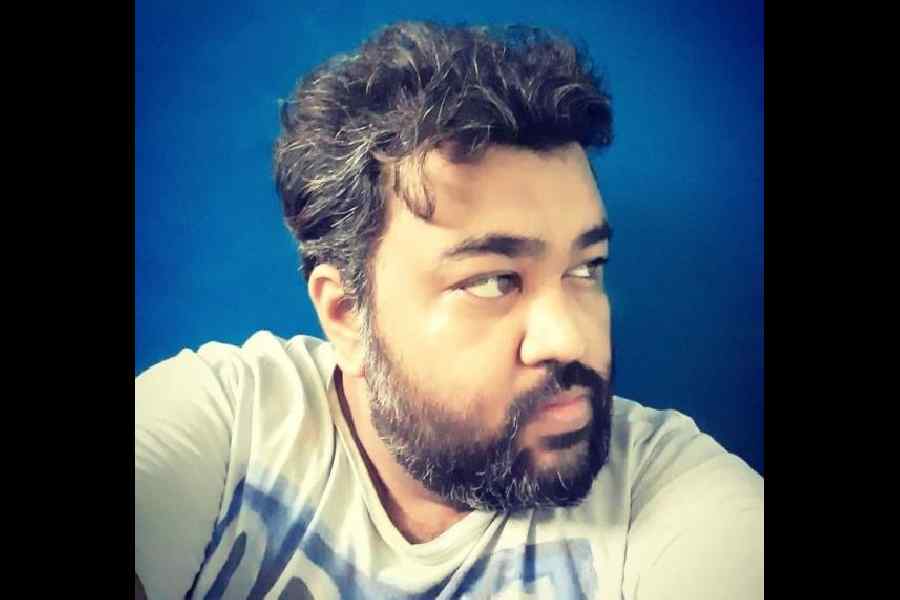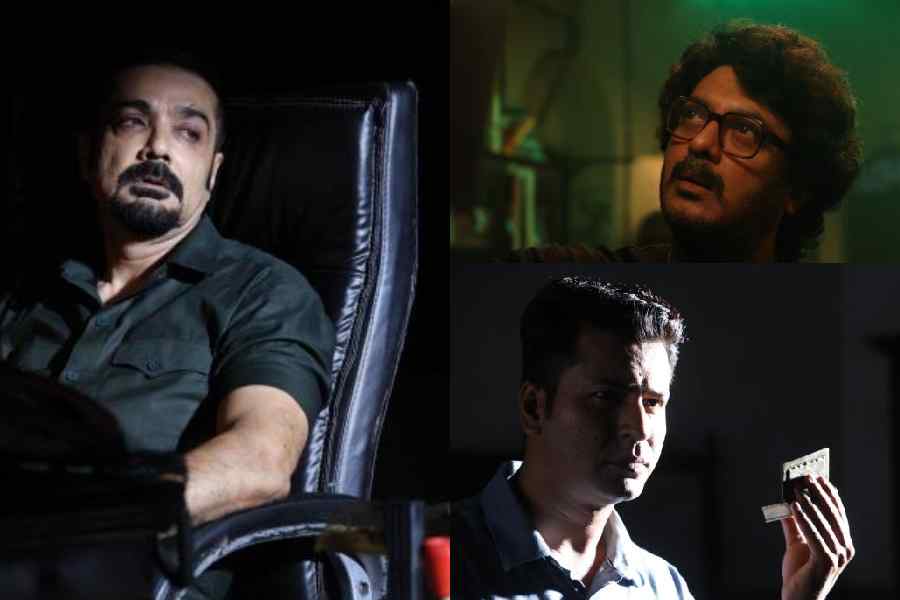The biggest challenge of making a sequel/prequel of a cult film and bringing back a much-loved character is living up to the expectations of audiences. Srijit Mukherji’s Dawshom Awbotaar gets it right to the hilt and ensures that audiences have a jolly good time with Probir Roy Choudhury. For many audiences, like me, 22shey Srabon was like a reintroduction of Prosenjit Chatterjee. Through Probir Roy Choudhury, a whole new generation of audiences became ‘Bumba Da’ fans. So when the character is brought back to the big screen, that too after a decade-long gap, sparks were bound to fly.
Dawshom Awbotaar is a prequel that shows Probir Roy Choudhury in his pre-retirement era — self-loathing, living in pain with the memories of his loved ones, yet, a kickass cop who is as fast with his gun as he is with his mouth. The swagger returns, so does the snark. Prosenjit Chatterjee makes cynicism look cool with his laid-back body language, sardonic one-liners and eyes that seem to have seen hell. However, he is not the only one who’s back. As Srijit Mukherji weaves a cop universe, another extremely popular character, Bijoy Poddar from the film Vinci Da, returns and proves to be an ideal match for Probir.

The best thing about 22shey Srabon was the chemistry between Probir and Abhijit Pakrashi. Their conversations, which ranged from comical to deeply philosophical, became instant pop culture phenomena and meme fodder due to the terrific writing. Dawshom Awbotaar lives up to the expectations in this aspect too. As with the buddy cop film trope, Probir and Bijoy form an investigating team, Probir being the experienced, serial killer expert, and Bijoy being the novice who is highly interested in serial killing cases. Together, they try to catch a serial killer, who has been killing off people and leaving signature cues related to the different avatars of Lord Vishnu. The story is straightforward, and the investigation portions follow the standard police procedural template. However, what makes things interesting is the constant banter between the two cops. As Probir teaches Poddar the ropes of serial killer hunting, the latter too contributes to the process with lightning-fast thinking. The senior-rookie dynamics play well, with Probir using his deadpan humour to pull Poddar’s leg every chance he gets, and Poddar too, delivering subtle comebacks while not overstepping hierarchical boundaries.
Srijit uses Prosenjit's inherent coolness and larger-than-life attitude and Anirban Bhattacharya’s superb comic timing and screen presence to create a duo you can’t take your eyes off. Things become more interesting when a third angle, a psychiatrist played by Jaya Ahsan, gets into the mix.
Jaya plays a psychiatrist, Moitreyei, who is torn between moral duty and professional ethics. As a professional, she is not supposed to share personal details shared by a patient. However, she cannot keep things to herself when she realises that her patient has gone on a killing spree. Jaya plays this tortured soul with tremendous vulnerability and tenderness, which makes one connect with her guilt. As this character gets involved in the hunt for the serial killer, Poddar falls for her, and thanks to Probir’s cynicism and apparent disrespect for emotional ties, things become complicated. What follows is an emotional rollercoaster ride, interspersed with a tense cat-and-mouse game between the cop duo and the sinister bad guy, who considers himself to be the Dawshom Awbotaar of Lord Vishnu.
Coming to the bad guy, this film is probably Jisshu Sengupta’s return to mainstream Bengali cinema, after quite some time. Srijit has given him some of his career-best characters in their previous outings together. This time is no different. There are so many serial killer films and series out there, it is very difficult to create an intriguing new character.
Jisshu’s take on the serial killer, ‘Bishwaroop’, is muted and devoid of typical psychotic mannerisms. The screenplay has tried to build him into a supervillain, but the character has ended up being a bit of a guy-next-door antagonist, which is not a bad thing. One cannot help but wish Jisshu had more screen time and the film would delve more into his hunting process. Yet, the less-is-more approach works here, and in a final showdown, where the Dawshom Awbotaar is finally revealed, the kind of scenery-chewing Jisshu does, makes one realise how badly he is missed in Bengali films currently due to his South Indian and Hindi film commitments. Rather than rely on style, Jisshu makes the killer humane and Srijit transforms him from an antagonist to a tragic hero you root for.
Now for the other aspects of the film, the kills are innovative — ranging from using a school of piranhas to turning a lift into a killing machine. The mythological thriller genre often leads to the writing involving too much info dumping, which ends up boring audiences. Thankfully, Dawshom Awbotaar refrains from this practice. The film has been shot beautifully by Soumik Haldar, who has captured the dark side of Calcutta in all its neo-noir glory. The use of locations is terrific too and you can really smell the murky streets and office spaces the film often shows. Though rooted in reality, the film often uses a masala approach, especially in the scenes which introduce its heroes. The BGM is terrific in the drama and investigative portions, but when the masala bits come in, the music is often too overpowering. A high point of the film is an intense chase filmed in the heart of the city. The camera moves in ways one can’t even imagine and travels in places you won’t expect. Great to see a really cool chase sequence in a Bengali film after ages!
However, with so much going for it, there are unfortunately some elements in Dawshom Awbotaar that are a bit of a letdown. Ever since the film was announced, there has been tremendous speculation about how Anirban Bhattacharya plays two characters set in the same universe (Khoka and Poddar). There is also a bit of overreliance on 22shey Srabon nostalgia, particularly in the first half. The use of expletives was refreshing in 22shey Srabon. But with respect to current times, it’s a bit overdone. Also, despite of all the world-building, one wishes Srijit explored his cop universe a bit more. Having seen other cinematic universe films, the audiences are bound to expect a few surprises here and there. One wishes other characters from the previous films would have been brought in, at least for cameos. These are all but minor issues and don’t change the fact that this is one hell of an entertainer.
Prosenjit’s Probir Roy Chowdhury is not a character, it is an emotion. You are bound to have a damn good time this Puja seeing Probir back in action. Now that Probir is back, one badly wishes Prosenjit would return to doing massier commercial cinema, which shows him in his true element — ‘larger than life’. Anirban brings his ‘A game’ too and shows tremendous range as usual — from being a cool-headed cop to an emotional mess. But, there needs to be more films made that tap into his comic timing. This duo is surely going to return, and the makers have already declared their plans to make more films featuring new cases of the ‘Probir-Poddar’ duo. I just hope that the wait won’t be a decade long next time. Srijit’s ‘Pujobarshiki,’ Dawshom Awbotaar is definitely ‘the’ Puja film to watch this year.











